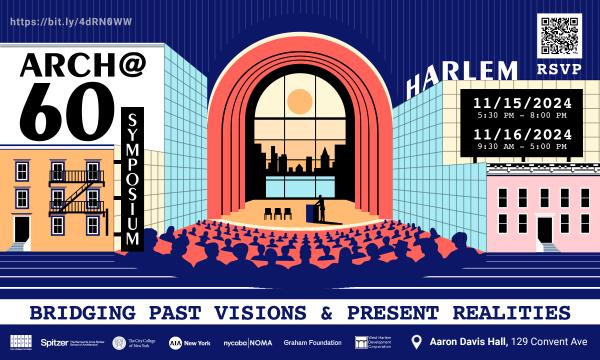
The physical and cultural changes in Harlem and NYC will be explored in a symposium to celebrate the 60th anniversary of the Architect's Renewal Committee in Harlem. The event will be held at CCNY's Aaron Davis Hall.
Grants from the Graham Foundation for Advanced Studies and the West Harlem Development Corporation (WHDC), in the amount of $10,000 each, were awarded to support ARCH @ 60: “Bridging Past Visions and Present Realities,” a celebration of the 60th anniversary of the Architects’ Renewal Committee (ARCH) in Harlem at CCNY’s J Max Bond Center for Urban Futures, Bernard and Anne Spitzer School of Architecture on Nov. 15 and Saturday, Nov. 16 at CCNY’s Aaron Davis Hall. The event critically examines the current shifts and their relative causes in the physical and cultural transformations of Harlem and New York City.
ARCH, established in 1964 by C. Richard Hatch, is recognized as one of the first community design centers in the U.S. It emerged during a period marked by the civil rights movement, anti-Vietnam War protests, and the burgeoning environmental movement. ARCH was instrumental in opposing urban renewal projects that threatened to dismantle communities in Harlem. The organization’s interdisciplinary approach, involving architects, planners, advocates, organizers, and educators, was pivotal in addressing the diverse needs of Harlem residents and community-based organizations.
The symposium will serve as a forum for critical information and knowledge exchange on community development, gentrification, housing financialization, and the impact of highly evolved market forces. Professionals, researchers, and citizen panelists will explore the relevance of the nonprofit community design center model in today’s context, the market forces that shape Harlem’s development, and the roles of policy and activism in supporting the production of affordable housing.
Events are free and open to the public but registration is required.
On Friday at 5.30 p.m., the keynote lecture, "Race, Gentrification and the Financialization of Housing", will be given by Dr. Seumalu Elora Lee Raymond, director, Ph.D. Program and assistant professor of City & Regional Planning at Georgia Institute of Technology, with a response from Moses Gates, vice president for Housing and Neighborhood Planning at the Regional Plan Association, immediately after.
The keynote is co-sponsored by the New York Chapter of the National Organization of Minority Architects (nycoba|NOMA); AIANY Diversity and Inclusion Committee and is this year's AIANY J Max Bond, Jr. Lecture.
On Saturday, program introduction and welcoming remarks begin at 10 a.m.
The panels are:
10:30 a.m. – 12 p.m.
Panel 1: Community Design in Harlem, Then and Now
Moderator: Venesa Alicea-Chuqui, Kean University; Brian Goldstein, Swarthmore College; Wayne Benjamin, Land Use, Community Board 12; Melvin Mitchell, Bryant Mitchell Architects; Roberta Washington, Roberta Washington Architects
1:30 PM - 2:50 PM
Panel 2: Housing Harlem
Moderator: Milton Curry, Cornell University Department of Architecture; Dominique Bernucca-Hood, Met Council on Housing; Gregory Baggett, APRSNA; Yvonne Stennett, Community League of the Heights; Kirk Goodrich, Monadnock Development
3:15 PM - 4:35 PM
Panel 3: 125th Street & the Shift of the Private Sector
Moderator: Shawn Rickenbacker, J. Max Bond Center, Spitzer School of Architecture, CCNY; Curtis Archer, Harlem Community Development Corporation; Kenneth Knuckles, New York City Planning Commission; Marc Norman, New York University, Schack Institute of Real Estate; Maxine Griffith, Trinity Church Wall Street
Closing remarks are at 4:35 p.m.
About The City College of New York
Since 1847, The City College of New York has provided a high-quality and affordable education to generations of New Yorkers in a wide variety of disciplines. CCNY embraces its position at the forefront of social change. It is ranked #1 by the Harvard-based Opportunity Insights out of 369 selective public colleges in the United States on the overall mobility index. This measure reflects both access and outcomes, representing the likelihood that a student at CCNY can move up two or more income quintiles. Education research organization Degree Choices ranks CCNY #1 nationally among universities for economic return on investment. In addition, the Center for World University Rankings places CCNY in the top 1.8% of universities worldwide in terms of academic excellence. Labor analytics firm Lightcast puts at $3.2 billion CCNY’s annual economic impact on the regional economy (5 boroughs and 5 adjacent counties) and quantifies the “for dollar” return on investment to students, taxpayers and society. At City College, more than 15,000 students pursue undergraduate and graduate degrees in eight schools and divisions, driven by significant funded research, creativity and scholarship. In 2023, CCNY launched its most expansive fundraising campaign, ever. The campaign, titled “Doing Remarkable Things Together” seeks to bring the College’s Foundation to more than $1 billion in total assets in support of the College mission. CCNY is as diverse, dynamic and visionary as New York City itself. View CCNY Media Kit.
Thea Klapwald
e:
tklapwald@ccny.cuny.edu